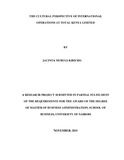| dc.description.abstract | International Business deals with the nature, strategy and management of international business enterprises and their effects on business and national performance (e.g., efficiency, growth, profitability, employment). Once the firm has entered and established itself in international markets, new concerns rest primarily with operational issues in order to develop and maintain a competitive advantageous position. To operate within a company‟s external environment, managers must have knowledge of business operations and a working knowledge of social sciences, and how they affect all functional business fields. Companies perform various activities in more than one country such as manufacturing, selling or even sourcing. The purpose of the research study was to determine the influence of culture on the international operations of Total Kenya Limited. The objectives of this study were to determine how culture influences the operations of Total Kenya Limited and how cultural orientation in international operations contributes to performance by Total Kenya Limited. The study was able to meet these objectives by employing a case study design. Both primary and secondary data was collected for this study. The primary data was collected using the interview guide questions while secondary data was drawn from relevant literature review. The study targeted eleven respondents who were senior managers and who have taken the lead position on the international operations of the organization with employees from different cultures. The researcher identified that possibilities abound for misunderstanding were based on cultural differences. Most managers‟ abilities to adapt to a new cultural setting, learning patterns of social interactions specific to that environment and responding appropriately, is weak. There is a great need to strengthen their cultural intelligence by adapting to other cultural rules, more so when interacting with other cultures, thus demonstrating esteem for them and how they do their business in their own culture. This leads to greater trust and openness which is vital in any business relation. The study found that culture in the foreign or home country influences the recruitment of employees, organizational learning, training and development of employees, creation of internal social networks, products advertisements and public relations The study also found Total Kenya‟s organizational culture encourages interaction between different levels management. The study revealed that culture in an organization influences management and performance of the organization. The study recommends that there is need for management to incorporate their customers‟ feedback in order to enhance consistency within the organization as this will positively influence the organization culture. They should also ensure employees understand the organizational goals, and then discuss how each person can contribute to the achievement of those objectives regardless of their cultural diversity. Cultural differences remain persistent and present an array of challenges for multinational companies. Firms that manage adaptation effectively are able to achieve congruence in the various cultures where they operate while extending their main sources of advantage across borders, and in some cases even making cultural diversity itself a source of advantage. | en_US |

